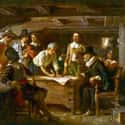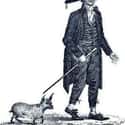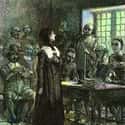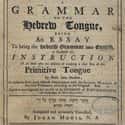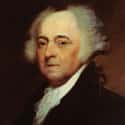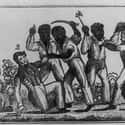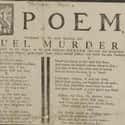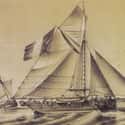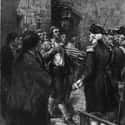-
(#1) America's First Killer Came Over On The Mayflower
John Billington was a passenger on the Mayflower, the ship that carried the first settlers to the New World in 1620. He sailed with his wife Elinor and their two sons and was one of the signatories of the first governing document of the colonies, the Mayflower Compact. He was also, by all accounts of the time, a real piece of work.
After landing, Billington quickly challenged the authority of Capt. Miles Standish and was punished for his speeches, which he continued to give anyway. He was then implicated in an uprising against the authority of the Plymouth church but insisted he was innocent and spared from retaliation. However, the governor of the colony later wrote to one of his opponents, "Billington still rails against you ... he is a knave, and so will live and die." Elinor Billington was later whipped in the stocks for slandering another colonist.
Billington was tried, convicted, and hanged for murdering a man he believed was his enemy. He waited in the woods, hiding behind a rock to ambush his rival who was out on a hunt, leveled his blunderbuss, and fired at close range. It was the first murder, first murder trial, and first execution in what would later become the United States of America.
-
(#2) Timothy Dexter Made Millions When He Should Have Lost Every Dime
Timothy Dexter was born into a family of poor farmers in Massachusetts in the mid-1700s. Dexter, though, refused to accept his family's station in life and set out to become wealthy and well-respected. He started out as a leather craftsman but made his fortune by using new dollars to purchase heaps of Continentals, the pre-independence currency of the 13 colonies, for a fraction of pennies on the dollar.
It was an insanely stupid bet that no one with any sense would have made, because Continentals had been discontinued and were no longer in use when he bought them. However, when America became independent, the government allowed Continentals to be traded in for 1% of their face value, which was way more than what Dexter paid for them. He made millions on a gamble.
That allowed him to indulge his fantasies: he called himself a lord, pretended to be a philosopher, and commissioned 40 statues of himself that he placed around his estate. Meanwhile, his aristocratic neighbors gave him horrendous investment advice in an attempt to bankrupt him, but to no avail. He thought the wealthy elite would embrace him now that he had money, but they shunned him, as they still saw him as low-class.
He was once urged to sell coals to Newcastle, an endeavor he then undertook. When he brought the coal to the English city which was internationally known for its supply, the local miners were on strike, so he actually made money! He also staged his own spectacular funeral, attended by 3,000, so he could observe the occasion while still among the living.
To celebrate his achievements, he wrote a near-incomprehensible memoir (Dexter was barely literate) that featured absolutely no punctuation. He handed out copies to his rich neighbors, who were, of course, horrified.
-
(#3) Anne Hutchinson Was A Revolutionary And Feminist Who Split From The Puritan Church
Anne Hutchinson was a member of the Massachusetts Bay Colony in the mid-1600s but quickly found herself at odds with the Puritan authorities. She demanded freedom of thought and led women's discussions of the scripture that were contrary to the views of church leadership. This led the colony's governor, John Winthrop, to declare her "an American Jezebel." Puritans viewed women as inferior, and Hutchinson, a mother of 15, broke with her church because of it.
She was arrested on accusations of dissident views as she claimed that heaven was attainable by anyone who prayed to God, not by behaviors and works. She was convicted and banished from the Colony. She and her family left Massachusetts to follow the teachings of Roger Williams in Providence, RI. Then, fearing further repression, they moved out of reach of the English to the Dutch area of Eastchester, NY, where they started their own government that called for the separation of church and state as well as trial by jury. She was massacred by Native Americans in 1643.
-
(#4) Judah Monis
- Dec. at 81 (1683-1764)
Judah Monis was born into a family of Portuguese conversos in 1683. Conversos were Jewish people who practiced Christianity publicly during the Inquisition but remained Jews in private. This heritage makes his destiny all the more intriguing: he became the first Jew to receive a degree in the colonies and also the first to teach at Harvard, but he had to convert to Christianity in order to do it.
After studies in Europe, Monis set up a shop in New York where he taught Hebrew to both Jews and Christians and led theological discussions on the Jewish mystical teachings of Kabbalah. He moved to Massachusetts and got his master's at Harvard in 1720. As Biblical students were required to read the sacred texts in their original language, the college also needed a Hebrew professor, hence his appointment. However, Harvard required all professors to be practicing Christians. It put Monis in a quandary: convert to Christianity after he spent his whole life promoting the teachings of Judaism, or give up on his dream.
In the end, he converted, but not without controversy. The Jewish community felt betrayed and the Christians doubted his sincerity.
-
(#5) John Adams
- Dec. at 91 (1735-1826)
He could hardly control himself. As a young man in Worcester, MA, John Adams was teaching school and studying law. But he knew he had problems. "He began a lifelong conversation with his internal demons," wrote Joseph J. Ellis in First Family: Abigail and John Adams.
When he was on a roll, he felt his passions made him explode like an "erupting volcano" and his emotions ran like "Lawless Bulls that roar and bluster, defy all Control, and sometimes murder their proper owner." Ellis wrote,
"Whether the source of John's periodic bursts of vanity, insecurity, and sheer explosiveness was mental or physical - there is some scholarly speculation that he had a thyroid imbalance - remains a mystery. There is no question, however, that he was susceptible to swoonish emotional swings, especially when under extreme stress, and he would struggle with this problem throughout his life."
Even though Adams was a great leader, he struggled to keep his emotions in check.
-
(#6) Jemmy Led One Of The First Colonial Slave Rebellions
The Stono Rebellion of 1739 was an uprising that took place in the British colony of South Carolina, led 20 slaves toward Florida, where the Spanish had promised freedom and land to slaves who fled the British.
Margaret Washington of Cornell University speculates on Jemmy, the rebellion's leader: "He may have come from a leadership family in Africa. He had some skills, some cultural skills, that were European. But at the same time, his sense of himself, his sense of identity, his sense of his community, was African."
The Stono Rebellion was the first slave revolt documented in the South. Some believed other slave uprisings were inspired by Stono. Others, however, say the slaves were reacting independently to the same harsh conditions that drove Jemmy and his allies to rebel. Still, in response to the rebellion, South Carolina's legislature quickly enacted the Negro Act in the hopes of disincentivizing slave rebellions. The act penalized and punished masters who abused their slaves, since they felt there was a connection between poor treatment and rebellion, as well as issued a temporary ban on importing slaves. This, however, was because white colonists feared the possibility of a larger African population than European. The act also made it illegal for slaves to learn to read or write.
-
(#7) William Beadle Killed His Family And Then Himself
Sometimes things aren't what they seem, but sometimes they are. Take the case of William Beadle, a resident of Wethersfield, CT, during the Revolutionary War and the early years of American independence.
Beadle had been a successful merchant but accepted Continental dollars even as they depreciated as demanded by the rebel government. Other merchants were not so patriotic and disobeyed the law to their financial advantage. Continental dollars were at one point worthless, then exchanged for new currency at a rate of 1 percent. That led to Beadle's financial downfall.
During the last year of his life, he seldom spoke to his wife or his four children. Meanwhile, he also developed a curious habit: he never slept without his ax and his carving knife. On a December morning in 1783, Beadle killed his entire family and slit his own throat. It was the first documented mass murder-suicide in the history of the United States.
-
(#8) Even In Colonial Days, Men Did Stupid Things For Love
Alexander White was a young Irish immigrant who came to America in the mid-1700s. He left his hometown of Tyrone on the Emerald Isle and landed in Boston. No sooner had he arrived than he fell in love with a local woman and proposed.
As a new arrival, he had barely enough money to support himself, let alone afford to wed. He decided to solve that problem not through patience and hard work, but through crime. He was working as a ship's mate aboard a cutter and tried to rob his captain when the ship was anchored in Cow Harbor on Long Island. The attempt went bad, however, and White killed the captain during a struggle.
A passenger witnessed the dramatic event and dove off the ship before White could kill him, too. The passenger then hurried to authorities and reported the crime. An arrest, trial, and conviction on charges of piracy and murder followed quickly. White was brought back to Massachusetts where a jury sentenced him to death by hanging in 1784.
-
(#9) Patience Boston Killed A Child In Retaliation Against The Child's Grandfather
Patience Boston was a Native American born in 1711 on an island off Cape Cod in Massachusetts. Her mother died when she was three, and her father bonded her into servitude with the Crow family, where she learned to read and obey the word of Christ.
Still, the family found her willful and defiant. She played on the Sabbath, told lies, and tried to burn down the house three times. As a teen, she went out at night, "kept bad company and followed lewd practices." When her term of service with the Crows came to an end, she married an African-American servant and became a servant to his master.
A series of misadventures followed, involving depraved drunkenness, abuse of her husband, and adultery. A child was born but died in infancy. She said she was pregnant again but the claim proved false. Her husband's master sold her to another man in Maine, who then sold her to another there. She had "some groundless Prejudice" against this last master and vowed to punish him by killing his grandson.
She pushed the boy down a well, "though I seemed to love him and he me," she said. She was executed for the crime in 1735.
-
(#10) Ethan Allen
- Dec. at 51 (1738-1789)
Ethan Allen was a hero of the Revolutionary War, politician, land speculator, the founder of Vermont, a Philosopher, and a self-taught theologian, among many other things. He's best known for the taking of the British Fort Ticonderoga in 1775, a landmark battle in the Revolutionary War. He had gathered his troop of Green Mountain Boys before dawn but grew impatient while waiting for reinforcements, fearing he might lose the cover of darkness. So he rushed into battle even though he didn't have enough men behind him. Despite that hot-headedness, he forced the British to surrender.
His account of his later imprisonment by the British was a seminal tract in the Revolutionary War, and he exploited that fame in his later political career, using self-aggrandizement to add to his wealth, and is now also seen as "no less rapacious as his archenemies, the New York land barons of the Hudson and Mohawk Valleys."
New Random Displays Display All By Ranking
About This Tool
After Columbus arrived in the Americas, European colonial empires began to colonize the American continent on a large scale. Before the 18th century, Britain established 13 British North American colonies on the Atlantic coast of the United States. With the consumption of war in Europe, the colonial empire imposed more stringent requirements and oppression on colonial Americans. After a series of cruel struggles, the colonies finally won their independence.
After European colonists came to the American continent, they carried out large-scale slaughter and plunder of Native Americans, and a large number of black slaves were trafficked to the colonial Americans. The random tool shares 10 stories about colonial Americans you did not know from books.
Our data comes from Ranker, If you want to participate in the ranking of items displayed on this page, please click here.











